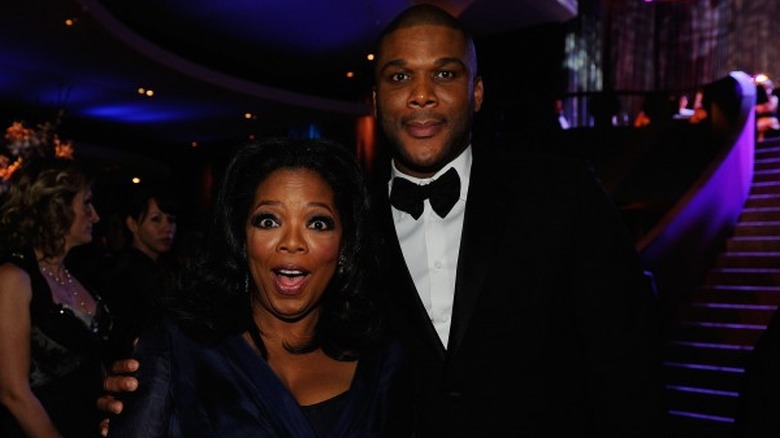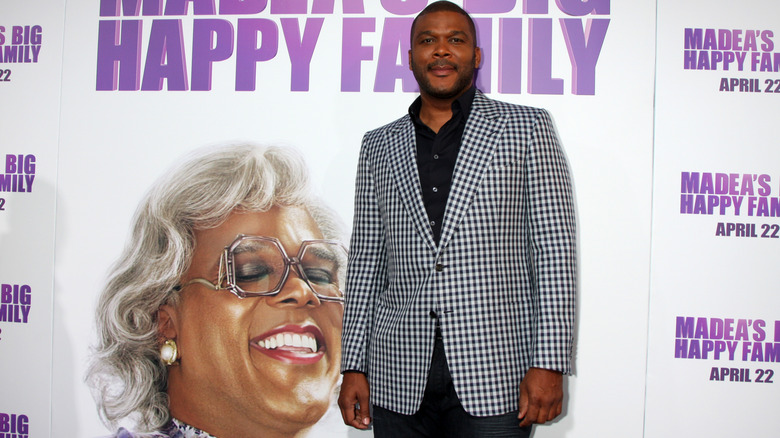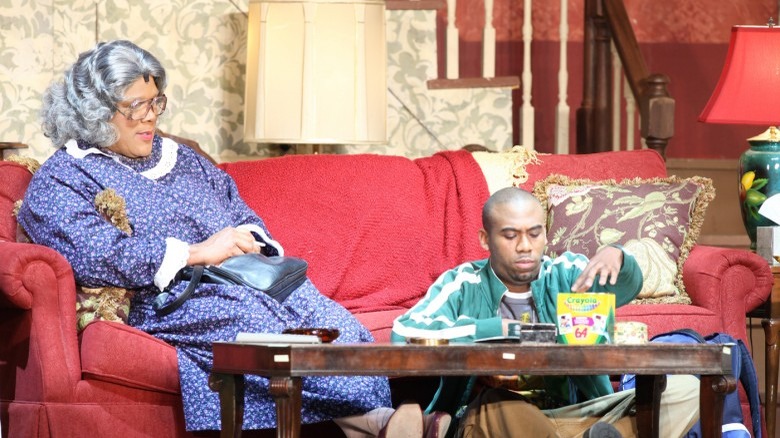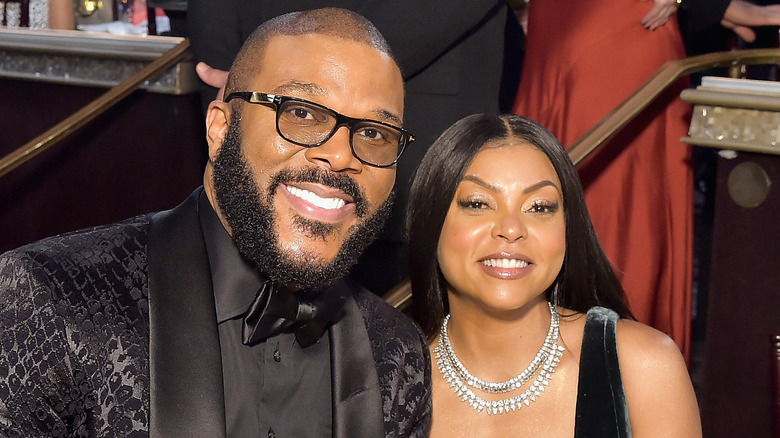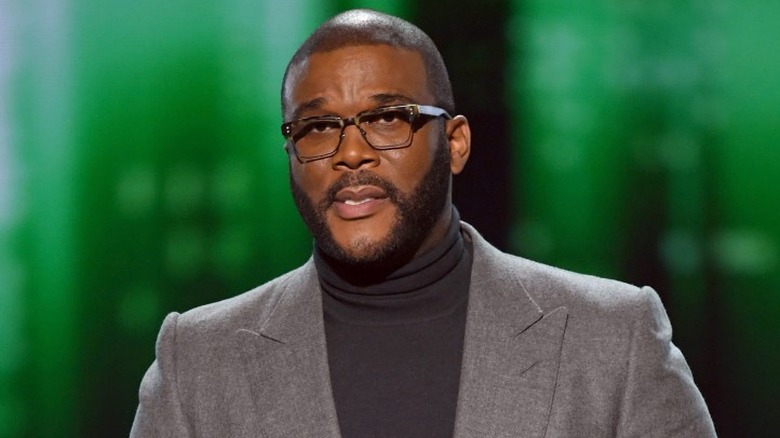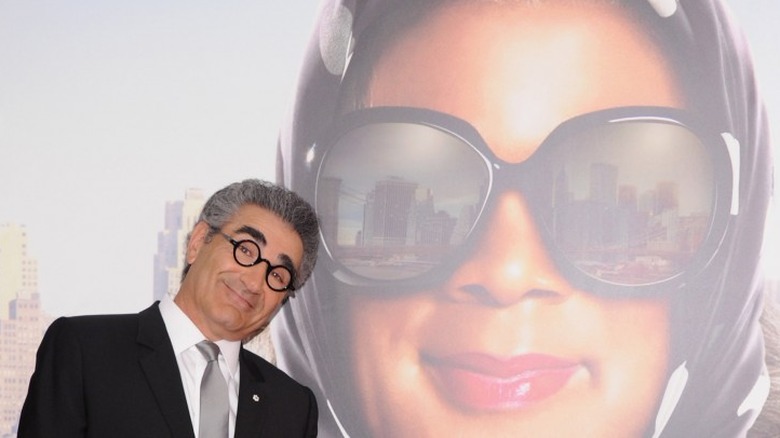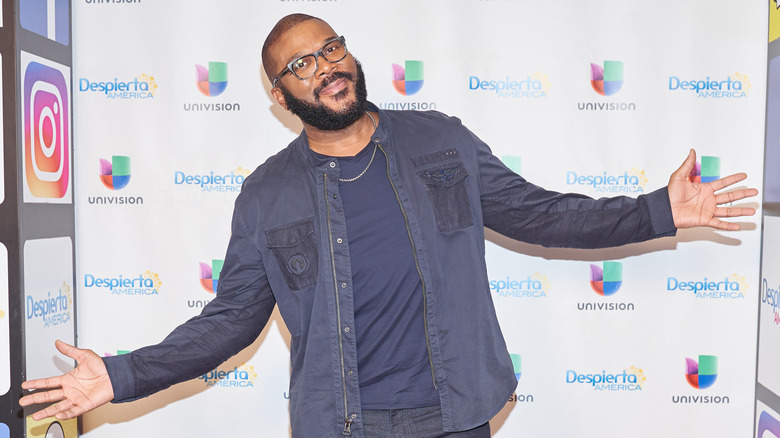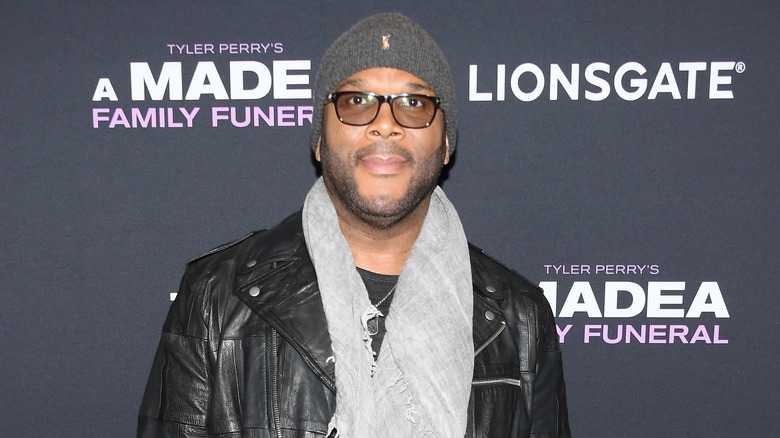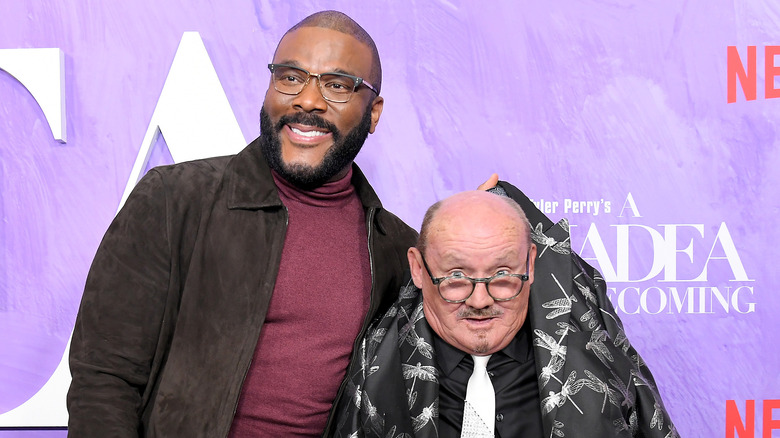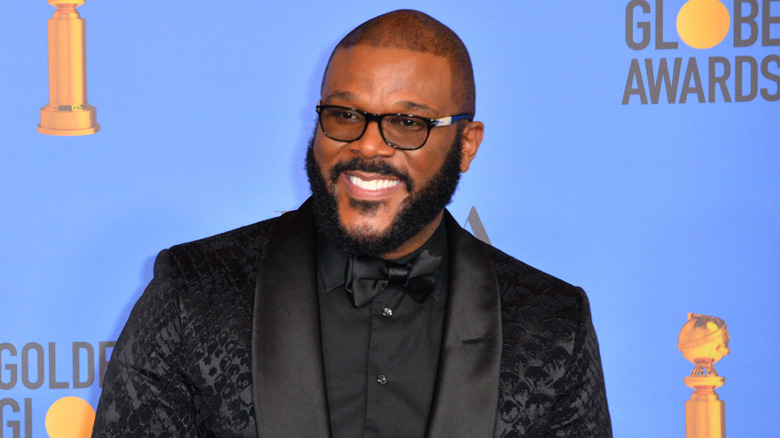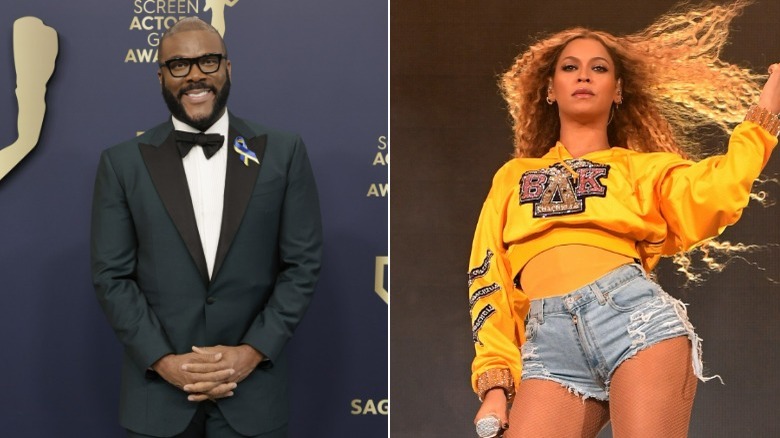The Untold Truth Of Tyler Perry's Madea Movies
The following article includes mentions of child abuse, sexual abuse, and attempted suicide.
Hallelujer! Tyler Perry's Mabel Simmons — aka Madea — is one of the most memorable characters in movies today. The star has featured this gun-toting granny in a slew of films since Madea's cinematic debut in 2005's "Diary of a Mad Black Woman." When the beloved character made her anticipated return to our screens in February 2022's "A Madea Homecoming" — exactly 17 years following Madea's first onscreen outing, as Perry revealed on Instagram — the Netflix-bound flick garnered a rather low 36% critics score on Rotten Tomatoes, but fared better among average Joe viewers, with an audience score of 71%. However, Variety's review seemed to side more with the latter. Calling it "the fastest, funniest Tyler Perry movie in a while," the outlet raved, "Madea, in her fusty way, has become eternal. Perry doesn't just play her, he channels her. Which may be why he can't (and shouldn't) stop."
Here are some things you may not know about Tyler Perry's Madea movies.
Oprah Winfrey indirectly inspired Madea
Tyler Perry's birth name was Emmitt Perry Jr., and he was born in New Orleans on September 13, 1969. He had a rough childhood, with a physically and mentally abusive father, leading Emmitt to change his name to Tyler when he was 16 to separate himself from his father. He also was sexually abused as a child by several neighbors. Things were so bad, the multi-talented star attempted suicide as a teen.
As a young adult, Perry heard future pal and collaborator Oprah Winfrey say on a 1992 episode of her eponymous show that writing about one's traumas could be cathartic. He admitted he didn't even know at the time what the word cathartic meant, but he ended up doing just that. He worked on various versions of his first play, "I Know I've Been Changed," which talked about childhood abuse, for six years and even lived in his car at times before it finally became a hit in 1998. Perry told Essence in 2009, "Can you imagine a six-foot-five man sleeping in a Geo Metro?" Everything would come full circle, of course, when Winfrey interviewed Perry while in character as Madea in 2006.
If you or someone you know may be the victim of child abuse, please contact the Childhelp National Child Abuse Hotline at 1-800-4-A-Child (1-800-422-4453) or contact their live chat services.
If you or anyone you know is having suicidal thoughts, please call the National Suicide Prevention Lifeline at 1-800-273-TALK (8255).
Madea started as a small stage character
When Tyler Perry started out as a playwright in the mid-'90s, he wrote plays that had music and melodrama, but no Madea. He did act in the plays, most notably as Joe, the man who would end up being Madea's brother, until he came up with her character. She appeared in his third play, 2000's "I Can Do Bad All by Myself" — and originally, Madea was only supposed to be in the play for five minutes. But when the lead actor of the show didn't turn up, Perry told Oprah Winfrey in an interview that he expanded the character.
Madea's debut was in Chicago's Regal Theater. Perry shared with Winfrey, "Five minutes before the show, I put on the costume and stood at the mirror for the first time. I'm saying, D***, are you really going to do this? Then the show started and I had no choice — they pushed me out onstage." The Madea we all know and love today was a little different in these very first performances, however. "She didn't talk very loud and her voice was much deeper and she sat in one spot the whole time," Perry explained. But when he finally stood up and moved around the stage, the audience laughed, and he got a "standing ovation" at the end.
Madea comes from Perry's mother, aunt, and Eddie Murphy
The roots of the tall, sassy ex-stripper grandma (her name on the poles was Platinum Bootie) came from Tyler Perry's abusive childhood. He shared with Essence that his mother took him to Lane Bryant and beauty parlors to keep him away from his father's wrath, so he saw adult women in a way that many children don't.
"The nurturing part of Madea comes from my mother, who would open the doors of our home to you no matter who you were," he told the magazine. "My aunt inspired the pistol-packing, the wig and the voice. She overpronounces her words and puts an r on everything to make it sound proper." Madea, which comes from "my dear," resonated with his mostly African-American audience, he noted, because she reminded them of their own relatives.
Eddie Murphy's 2000 film "Nutty Professor 2: The Klumps" also influenced the role. Not only did Murphy play a woman, but he did multiple roles in the movie. Like Murphy did in this movie, Perry would ultimately play multiple roles, including dinner scenes of his own as Madea's brother, Joe, and her nephew, Brian.
Tyler Perry had a hard time getting the first Madea movie made
Tyler Perry wrote, directed, and starred in several plays featuring Madea in the early 2000s that were huge hits on the urban theater circuit, including "Diary of a Mad Black Woman," "Madea's Family Reunion," and "Madea's Class Reunion." But when he tried to get "Diary of a Mad Black Woman" made into a film, he ran into resistance. "I went to a big studio, and the guy tells me Black people who go to church don't go to movies," Perry told ABC News in 2005. "That's what the guy said to me."
Also, Madea wasn't a known character outside the African-American community, so critics didn't quite know what to make of her. Like Roger Ebert, who complained about "Diary of a Mad Black Woman" that she "brings the movie to a halt every time she appears." So much for that: The 2005 movie cost $5 million to make, grossed $50 million, and launched Madea into the mainstream.
A Madea movie is a fun formula
Most of the Tyler Perry films starring the matriarch have a certain formula. Although Madea's name is usually in the title, she is not in every scene. There is also usually some sort of message behind the comedy. 2016's "Boo! A Madea Halloween" is ostensibly a comedic horror film, but it's really about Madea's nephew being too weak with his teenage daughter, and Madea straightening things out. Earlier romantic movies like "Diary of a Mad Black Woman" and "Madea's Family Reunion" are about good women being treated terribly by abusive husbands, with Madea making things right.
Perry said in a 2016 interview with the Los Angeles Times, "If you look at everything I do — even in 'Boo,' there's a message, and it's always 'faith, family, forgiveness.'" He added, "That's the greatest gift that I've been given. I can get a message to the very people I grew up with, the millions who love what I do. I can get a message to them when others can't. I can wrap it in a comedy, I can wrap it in a drama. So it becomes entertaining but still gives hope."
The theater version of Madea is different from the movie one
Most of the Madea movies started out as one of Tyler Perry's touring plays. Not only do these stage productions have a musical aspect the films don't, but the Madea in the theater was even more outrageous, especially in the early days, with lots more gun use and pot smoking. The star eventually toned down the character a little because, with the movies being on a higher-profile and more accessible platform, a newer younger audience began watching.
"I realized how many children were paying attention, so I wanted to her to be a little more responsible," Perry explained to Atlanta's Creative Loafing back in 2011, having noted that moving between work in theater and film throughout his career helped him get "used to working at a brutal pace." The actor-writer added, "So in that sense, she's changed. But for the most part, she's pretty much stayed true to the same old pain in the a**."
Tyler Perry has given many big breaks with Madea
Some Hollywood stars have gotten their big break by being in a Madea movie. Shemar Moore was a relative unknown when he was cast as the love interest in 2005's "Diary of a Mad Black Woman." Shortly after that role, he got a big part in the then-new series "Criminal Minds," where he stayed for over a decade. Sofia Vergara appeared in 2008's "Meet the Browns" and in "Madea Goes to Jail" — alongside "How to Get Away with Murder" star Viola Davis, no less — the following year, both shortly before she started her longtime run on TV's "Modern Family."
Meanwhile, Taraji P. Henson credits Perry, who cast her in 2009's "I Can Do Bad All by Myself," with getting her to ask for more money. "I was grateful for the work, but even more, I'm grateful to Tyler for putting me on the road to being paid my worth," Henson wrote in her 2016 memoir "Around the Way Girl" (via Vulture). "It was he who gave me a fair wage to star in his movie, which ultimately raised my quote — the baseline pay I could negotiate going into subsequent movie deals. ... It was because of him — not an Oscar nomination — that I never had to take another movie project at the rock bottom of six figures."
He has said he hates playing Madea
Even though Tyler Perry has done other non-Madea movies, and earned great reviews acting in movies like 2014's "Gone Girl," Madea is the role he's best known for. But the costume is very hot, and it hurts to talk in a higher-pitched voice for hours at a time. "As much as I hate playing the character, it works pretty well," he told a reporter for Creative Loafing in 2011. When the actor-writer was asked why, he said, "Oh my God. Being in Georgia in a fat suit, and wig and makeup, in the middle of summer? The physicality of it is no fun."
Perhaps it's no surprise, then, that the star much prefers playing Madea on stage than on screen. "Oh, it's totally the stage for me," he told Vibe when asked his preference in February 2022. "That stage, that give and take. Now, I can tell you that's done. I really don't think I'm ever going to do another tour again, but that being on stage and back and forth with the people in the audience, that's really powerful."
The ever-expanding Madea audience is not without its critics
When Tyler Perry started performing Madea, the audiences were almost all Black, as was the cast. As the movies grew in popularity, its audience expanded to the white and Latino communities, and the movies also had some non-Black characters. The star told RogerEbert.com in 2016, "My base has always been what it is, but my audience has definitely evolved and changed over the years."
One critic who went to see 2016's "Boo! A Madea Halloween" on opening night in Virginia even said that the audience "was filled with rural, elderly white people donning Trump t-shirts." For his part, Perry has said that his audience these days relate to his movies "not even about race as much as it is about stories that people can relate to," telling Vulture, "I know for a fact that a lot of my audience cannot afford to just get in the Volvo and go to a therapist and spend the day off and go to the spa."
That said, not everyone's on board with Madea. Spike Lee and others have criticized the character for purporting negative stereotypes. But Perry has claimed that they miss the point of the themes in the Madea films. "They miss the messages of empowerment," he told CNN in 2009. "Sure, the silliness of 'Madea,' the silliness of 'Brown,' it's broad, it's over the top. Great. Fine. I get it. But how can you miss the message of forgiveness? How can you miss the messages of empowerment?"
Madea essentially built Tyler Perry's studio
Tyler Perry has an empire now, with his own Atlanta-based movie studio, thanks mostly to the ongoing success and popularity of his Madea character. The latest iteration of the studio is on a decommissioned army base, per the Los Angeles Times. How big is the studio? It's on 330 acres. To put that in perspective, the outlet notes that the Warner Bros. studio is on 145 acres and the Disney studio is on just 51 acres.
"Sometimes I drive around here by myself and think, 'Is this too much, or is this what I'm supposed to do?'" Perry, who the newspaper revealed was "the first African American to own a major film studio outright," admitted. "The answer is obvious," he added. "When this fell into my lap, I said, 'I have to do this.' This is the endgame."
As previously mentioned, Perry has also partnered with Oprah Winfrey, his old inspiration, when it comes to creating programming for her OWN network. It all indeed has come full circle for this multi-talented star.
Tyler Perry wanted to retire Madea
Tyler Perry was ready to retire Madea for good in 2019 after 20 years of playing the character. At the time, he was about to turn 50 and apparently ready to move on as an actor. He revealed to The Hollywood Reporter, "I don't want to be her age playing her, so it was time to shut it down and move on." He continued, "I've got some other things I want to do, and in this next 50, I'm going to do something different."
While Perry has gone on to do different things, it appears he never wanted to completely close the door on Madea by killing her off. He dished, "It's always going to be open-ended because what you don't want to do is murder a family member. And a lot of people feel like she's a family member." Yet the "Don't Look Up" actor did feel that, at the time, he did all he could with the character. He explained to CNN, "She's also run out of things to say in my point of view. So if there's something else for her to say maybe one day she'll return."
Perry was happy to leave things on a positive note though, pointing out, "So many people have loved her. It's been a great franchise." There was one person, however, who might not have agreed with Perry's decision to end it: His late mother. Perry dished, "She told me whatever you do, don't stop playing this character. She loved Madea."
He used Madea to get people laughing again
By 2022, Tyler Perry felt the world could use some Madea to lighten things up a bit. He explained that was why he made the Netflix movie, "A Madea Homecoming," telling Collider, "I was tired of doing the character. It had been a good run. But looking at the state of the world and everything that was happening, I wanted to do something to make people laugh." Perry reiterated that to Entertainment Weekly, pointing out "how polarized" things had been, even adding, "Nobody's laughing. Nobody's getting the chance to belly-laugh anymore."
Perry apparently realized that the best way he could do something about that was through the Madea movies. He recalled, "I was like, 'What do I have in my toolbox to make people laugh?' It's clearly Madea, so I just wanted to bring that out." Perry praised his new co-star, Brendan O'Carroll, for also bringing the laughs. The "A Fall from Grace" star gushed, "The amount of ad-libs that he comes up with, I had to remind myself to stop watching him because he's so funny, and not laugh."
It seems Perry's whole goal for the Madea films is to bring people some much-needed joy. He explained to 21 Ninety that when it comes to his audience, "If you're watching on your couch, I want you to go to the kitchen laughing. ... Let's sit and have some wine, watch this, and laugh our heads off."
Madea has continued to spread positive messages
While it's clear that the Madea films are comedies, creator Tyler Perry has also used the character to touch on important issues. The "Vice" actor told Collider that when doing so he's not "poking fun" at issues, but instead "highlighting them" and "using laughter to be the anesthetic to get us to talk about it." He continued, "I just think that so much is plaguing us as a society, we need to at least address some of it. I thought, 'Hey, maybe this is a way that Madea could at least be talking about these things.'"
For "A Madea Homecoming," in particular, Perry incorporated an LGBTQ+ storyline to promote inclusion. He told Entertainment Weekly why that was important to him, saying, "I just think that if everything gets accepted in love, then you get a chance to see the person for who they are rather than what you think they are." He reiterated that on "The Kelly Clarkson Show," saying, "I was looking at the trauma and the heartache ... so I wanted to show a gay character coming out to his family, a Black family, and they're embracing him and showing him love."
It seems that Perry uses Madea to spread positivity in general. "Everything that bombards us all day long is negativity ... on your phone, on the news," he went on to dish, adding, "I wish there was more balance of ... the positivity so people can start to feel good, that's why I wanted to bring Madea back."
Tyler Perry's Madea channeled Beyonce
Madea can seemingly do it all, even portray Beyoncé, which is exactly what she did at the end of 2022's "A Madea Homecoming." Tyler Perry, as Madea, channeled the music superstar's 2018 Coachella concert with a performance of their own. Perry dished to Entertainment Weekly, "I thought, 'There is no way that I can call this [Madea] movie 'Homecoming' and not do some sort of homage to the Queen B.'" Of course, Perry did get Beyoncé's approval beforehand, as he revealed to Collider, "The first person I called was her and said, 'Hey, take a look at this. How do you feel about this.' She laughed herself to silly, so I thought, 'Okay, we gotta right thing to do.'"
Perry took it a step further, telling EW, "Before anybody saw it, before Netflix saw it, I sent her a clip." He recalled her reaction to ET, saying, "[Beyoncé] sent me this text that is just saying, 'D E A D.'" Despite her encouragement, Perry was still apparently super nervous to take on the icon. "I definitely had to smoke a joint to be able to get through that whole thing. ... I had a couple of puffs before I could hit that stage. That was a lot for me," he admitted.
It seems that if Madea can impress Beyoncé, then she can do anything, which is pretty much what Perry has done with her throughout the franchise. Despite Perry's past attempts to retire Madea, audiences seemingly aren't ready to give up their favorite grandma.

